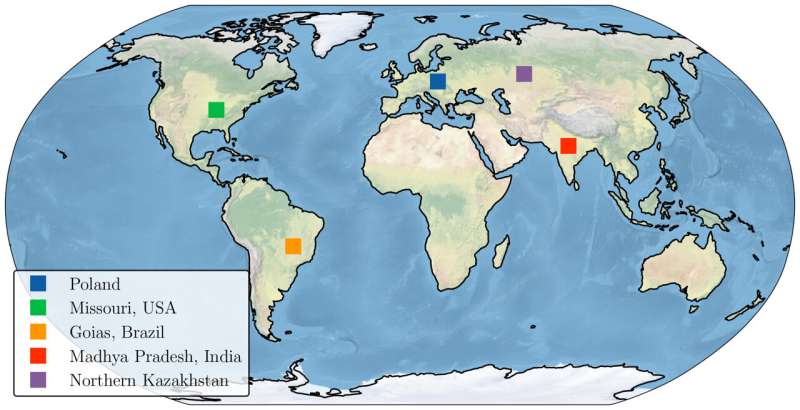This article has been reviewed according to Science X's editorial process and policies. Editors have highlighted the following attributes while ensuring the content's credibility:
fact-checked
preprint
trusted source
proofread
AI may be able to predict droughts a year in advance

Skoltech researchers and their colleagues from Sber have proposed deep learning models that predict droughts using climate data. Long-term forecasts of this kind are sought by agricultural producers planning their operations, as well as by insurance companies and banks evaluating climate risks and fine-tuning corporate credit ratings.
The findings are reported in the journal Environmental Modelling & Software and are also available as a preprint on the arXiv online repository.
In making plans, an agricultural producer has to account for the possibility of a drought affecting its business, and lenders seek to factor those risks into corporate credit rankings. Insurance companies, too, need to quantify climate risks to determine the premium amount.
All these businesses would greatly benefit from accurate long-term predictions of impending drought periods. Such forecasts, however, have remained unavailable due to the stochastic (random) nature of climate phenomena and the complexity of the data used.
Skoltech and Sber researchers propose a complex approach for predicting droughts several months or even a year before they occur. The team's solution fuses AI with classical methods. It relies on spatiotemporal neural networks and openly available monthly climate data.
The models were tested on data from five regions spanning multiple continents and climate zones: Poland, the U.S. state of Missouri, the Goias state in Brazil, the Indian state Madhya Pradesh, and northern Kazakhstan.
"Tests allowed us to identify our modification of the transformer-based EarthFormer model as the best for making medium-term predictions, whereas a modified version of the ConvLSTM model performed the best in long-term predictions. Our model delivers a high quality for a variety of climate zones. Owing to the reliable AI methods used, that quality will remain high for the next 10 years," explained the study's principal investigator, Assistant Professor Alexey Zaytsev, who heads the joint Skoltech-Sberbank Laboratory of Applied Research at Skoltech Applied AI.
The paper's lead author, Senior Research Engineer Alexander Marusov of Skoltech Applied AI, said, "Forecasting droughts is a concern of utmost importance in many parts of our country, including in my native Astrakhan region. This natural phenomenon is, however, difficult to model, because many diverse factors have to be accounted for, global warming among them. Our models make it possible to predict droughts a year in advance."
The results of this research will be used by Russia's largest bank in its risk management system.
Study co-author Nazar Sotiriadi, the executive director of Sber's Integrated Risk Management Department, said, "While climate risks in Russia are not as apparent as in countries with denser infrastructure, they are already making a significant impact on the economy. Droughts create risks for agriculture, energy facilities, and the population.
"We use the results of research carried out jointly with our Skoltech colleagues to increase the accuracy of our ratings both for insurance and loans. In the coming years, managing these risks could have a greater effect on business than we anticipated three to five years ago. And such tasks invariably require models for assessment."
More information: Alexander Marusov et al, Long-term drought prediction using deep neural networks based on geospatial weather data, Environmental Modelling & Software (2024). DOI: 10.1016/j.envsoft.2024.106127. On arXiv: DOI: 10.48550/arxiv.2309.06212
Journal information: arXiv
Provided by Skolkovo Institute of Science and Technology



















